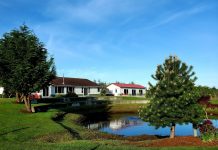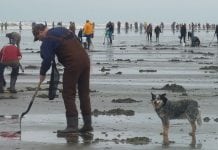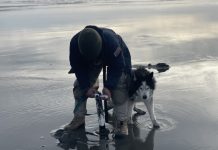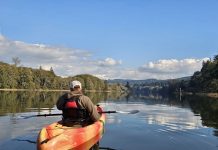This calendar is the place to find fun events happening throughout Grays Harbor County including Aberdeen, Hoquiam, Westport, Ocean Shores, Elma, Montesano and beyond.
Have an event that isn’t listed? Please email events@GraysHarborTalk.com with the following information:
- Name of Event
- Date, time and location (name of business if applicable and complete address)
- Organizer(s) name
- Cost
- URL to purchase tickets
- Website URL
- SHORT description of event
- Photo
Our editors will review and post within a few business days.
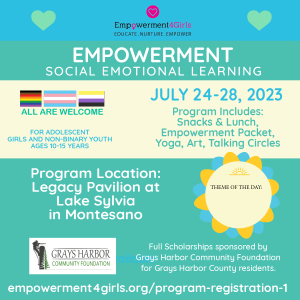
During this week-long program, participants will practice research-based emotional regulation tools to increase self-awareness and resilience. Through talking circles, guided art projects, community-building games, and mindfulness activities, youth will learn about expressing themselves, fostering healthy relationships, the importance of self-care, and responsibility to our communities and our world.
The registration fee is $0 thanks to sponsorship from Grays Harbor Community Foundation.

During this week-long program, participants will practice research-based emotional regulation tools to increase self-awareness and resilience. Through talking circles, guided art projects, community-building games, and mindfulness activities, youth will learn about expressing themselves, fostering healthy relationships, the importance of self-care, and responsibility to our communities and our world.
The registration fee is $0 thanks to sponsorship from Grays Harbor Community Foundation.

During this week-long program, participants will practice research-based emotional regulation tools to increase self-awareness and resilience. Through talking circles, guided art projects, community-building games, and mindfulness activities, youth will learn about expressing themselves, fostering healthy relationships, the importance of self-care, and responsibility to our communities and our world.
The registration fee is $0 thanks to sponsorship from Grays Harbor Community Foundation.

During this week-long program, participants will practice research-based emotional regulation tools to increase self-awareness and resilience. Through talking circles, guided art projects, community-building games, and mindfulness activities, youth will learn about expressing themselves, fostering healthy relationships, the importance of self-care, and responsibility to our communities and our world.
The registration fee is $0 thanks to sponsorship from Grays Harbor Community Foundation.
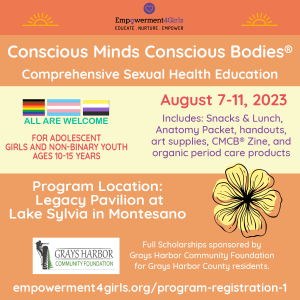
**Registration fees are $0 thanks to sponsorship from Grays Harbor Community Foundation.
Program Overview
Our curriculum is unbiased, factual sexual health information supported by the Washington State Health Education k-12 Standards. Participants will learn about anatomical terms, pregnancy and STI prevention, puberty changes, gender identity, gender norms and social pressure, sexual orientation, and how to be an ally.
The social-emotional skills taught in CMCB® align with the Washington State Social Emotional Learning (SEL) standards for k-12, which include practicing giving and denying consent, social media moderation, and using nonviolent communication to set and maintain boundaries. Through experiential learning, participants will practice several evidence-based self-regulation and self-care strategies, including mindfulness activities, intentional social interactions and protective measures for their mental health.
?
Our sex-positive approach encourages participants to be confident self-advocates for their reproductive health. By the end of the program, participants will have developed their body literacy practice, learned several self-regulation strategies and practiced advocating for themselves and others to create a more just society.
Learning topics:
Anatomy and Puberty
Consent and Boundaries
Gender Identity
Sexual Orientation
Stages of Pregnancy
Building Confidence
Social Media Awareness
Pregnancy and STI Prevention

**Registration fees are $0 thanks to sponsorship from Grays Harbor Community Foundation.
Program Overview
Our curriculum is unbiased, factual sexual health information supported by the Washington State Health Education k-12 Standards. Participants will learn about anatomical terms, pregnancy and STI prevention, puberty changes, gender identity, gender norms and social pressure, sexual orientation, and how to be an ally.
The social-emotional skills taught in CMCB® align with the Washington State Social Emotional Learning (SEL) standards for k-12, which include practicing giving and denying consent, social media moderation, and using nonviolent communication to set and maintain boundaries. Through experiential learning, participants will practice several evidence-based self-regulation and self-care strategies, including mindfulness activities, intentional social interactions and protective measures for their mental health.
?
Our sex-positive approach encourages participants to be confident self-advocates for their reproductive health. By the end of the program, participants will have developed their body literacy practice, learned several self-regulation strategies and practiced advocating for themselves and others to create a more just society.
Learning topics:
Anatomy and Puberty
Consent and Boundaries
Gender Identity
Sexual Orientation
Stages of Pregnancy
Building Confidence
Social Media Awareness
Pregnancy and STI Prevention

**Registration fees are $0 thanks to sponsorship from Grays Harbor Community Foundation.
Program Overview
Our curriculum is unbiased, factual sexual health information supported by the Washington State Health Education k-12 Standards. Participants will learn about anatomical terms, pregnancy and STI prevention, puberty changes, gender identity, gender norms and social pressure, sexual orientation, and how to be an ally.
The social-emotional skills taught in CMCB® align with the Washington State Social Emotional Learning (SEL) standards for k-12, which include practicing giving and denying consent, social media moderation, and using nonviolent communication to set and maintain boundaries. Through experiential learning, participants will practice several evidence-based self-regulation and self-care strategies, including mindfulness activities, intentional social interactions and protective measures for their mental health.
?
Our sex-positive approach encourages participants to be confident self-advocates for their reproductive health. By the end of the program, participants will have developed their body literacy practice, learned several self-regulation strategies and practiced advocating for themselves and others to create a more just society.
Learning topics:
Anatomy and Puberty
Consent and Boundaries
Gender Identity
Sexual Orientation
Stages of Pregnancy
Building Confidence
Social Media Awareness
Pregnancy and STI Prevention

**Registration fees are $0 thanks to sponsorship from Grays Harbor Community Foundation.
Program Overview
Our curriculum is unbiased, factual sexual health information supported by the Washington State Health Education k-12 Standards. Participants will learn about anatomical terms, pregnancy and STI prevention, puberty changes, gender identity, gender norms and social pressure, sexual orientation, and how to be an ally.
The social-emotional skills taught in CMCB® align with the Washington State Social Emotional Learning (SEL) standards for k-12, which include practicing giving and denying consent, social media moderation, and using nonviolent communication to set and maintain boundaries. Through experiential learning, participants will practice several evidence-based self-regulation and self-care strategies, including mindfulness activities, intentional social interactions and protective measures for their mental health.
?
Our sex-positive approach encourages participants to be confident self-advocates for their reproductive health. By the end of the program, participants will have developed their body literacy practice, learned several self-regulation strategies and practiced advocating for themselves and others to create a more just society.
Learning topics:
Anatomy and Puberty
Consent and Boundaries
Gender Identity
Sexual Orientation
Stages of Pregnancy
Building Confidence
Social Media Awareness
Pregnancy and STI Prevention

**Registration fees are $0 thanks to sponsorship from Grays Harbor Community Foundation.
Program Overview
Our curriculum is unbiased, factual sexual health information supported by the Washington State Health Education k-12 Standards. Participants will learn about anatomical terms, pregnancy and STI prevention, puberty changes, gender identity, gender norms and social pressure, sexual orientation, and how to be an ally.
The social-emotional skills taught in CMCB® align with the Washington State Social Emotional Learning (SEL) standards for k-12, which include practicing giving and denying consent, social media moderation, and using nonviolent communication to set and maintain boundaries. Through experiential learning, participants will practice several evidence-based self-regulation and self-care strategies, including mindfulness activities, intentional social interactions and protective measures for their mental health.
?
Our sex-positive approach encourages participants to be confident self-advocates for their reproductive health. By the end of the program, participants will have developed their body literacy practice, learned several self-regulation strategies and practiced advocating for themselves and others to create a more just society.
Learning topics:
Anatomy and Puberty
Consent and Boundaries
Gender Identity
Sexual Orientation
Stages of Pregnancy
Building Confidence
Social Media Awareness
Pregnancy and STI Prevention
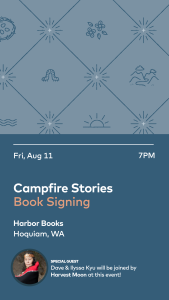
Join us for an indoor camping-themed event at Harbor Books. Curl up with a book in a cozy reading nook, enjoy live music and campfire treats, and meet Dave and Ilyssa Kyu, co-editors of Campfire Stories Volume II: Tales from America’s National Parks and Trails. We will also be joined by contributor Harvest Moon who will do a reading and sign books. Fun for all ages! More information at: https://www.booksontheharbor.com/harbor-books-events/campfirestories
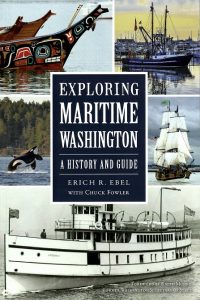
The Museum of the North Beach will be hosting a book signing on Saturday, August 12 from 10am to 12 noon for Exploring Maritime Washington by author Erich Ebel.
Discover the popular destinations and hidden gems along Washington’s coastline, from the Mukilteo Lighthouse to the Wedding Rocks petroglyphs and beyond. Learn about the seafaring Coast Salish people, who navigated the waters of the Pacific Northwest for thousands of years, and the early exploration and settlement by European Americans in the late eighteenth century. Delve into the expansion and growth that led to the development of international ports and the modern maritime economy. View the enormous sternwheel snagboat W.T. Preston—one of a trio that kept inland waterways navigable for nearly a century—and hundreds of other fascinating sites. Join author Erich R. Ebel on a journey through the cultural and nautical history of the Maritime Washington National Heritage Area and beyond.
Erich R. Ebel was born in Spokane, Washington, and has had stories to tell ever since. During his ten years as a TV and radio journalist and twenty in communications and marketing, Erich pursued his passions—the history, heritage and culture of the greatest state in the Lower 48. His blog, videos and podcasts hold a treasure-trove of Washington facts and help promote local history worldwide. Learn more at www.washingtonourhome.com.
Erich spent several hours at the Museum of the North Beach in April 2021 doing research. His 222 page book sells for $24.00 and is loaded with photographs including a segment about the Museum, some of our local history and the amazing story of the 1892 shipwreck of the British bark Ferndale at Copalis Beach.
WDFW approves four days of coastal razor clam digs beginning Oct. 14
WDFW shellfish managers propose an alternative digging schedule for Copalis and Mocrocks beaches beginning in 2024
OLYMPIA – Washington Department of Fish and Wildlife (WDFW) shellfish managers confirmed today razor clam digging opportunities at Long Beach, Twin Harbors, Copalis, and Mocrocks beaches begin Oct. 14.
“After a successful first tide series of the season, we are excited to announce another round of digs for this weekend, and we’re very happy to get Mocrocks back into the mix,” said Bryce Blumenthal, a WDFW coastal shellfish biologist.
The optimal digging occurs between one and two hours before the listed time of low tide. The following digs during evening (p.m.) low tides will proceed as scheduled, after marine toxin results from the Washington Department of Health (WDOH) showed razor clams are safe to eat:
- 14, Saturday, 7:17 p.m.; 0.2 feet; Long Beach, Twin Harbors, Mocrocks
- 15, Sunday,7:52 p.m.; -0.1 feet; Long Beach, Twin Harbors, Copalis
- 16, Monday, 8:28 p.m.; -0.3 feet; Long Beach, Twin Harbors, Mocrocks
- 17, Tuesday, 9:06 p.m.; -0.4 feet; Long Beach, Twin Harbors, Copalis
- 18, Wednesday, 9:49 p.m.; -0.3 feet; Mocrocks
Marine toxin levels have been decreasing according to the WDOH guidelines. WDOH requires two test samples taken seven to 10 days apart, and domoic acid levels must fall under the guideline level before a beach can reopen for digging. Domoic acid, a natural toxin produced by certain types of marine algae, can be harmful or fatal if consumed in sufficient quantities. More information about domoic acid, as well as current levels at ocean beaches, can be found on WDFW’s domoic acid webpage.
Final approval of marine toxin testing usually occurs about a week or less – sometimes two to three days – prior to the start of each digging series. Below are additional tentative dates:
- 27, Friday, 6:18 p.m.; -0.4 feet; Long Beach, Twin Harbors, Mocrocks
- 28, Saturday, 7:03 p.m.; -1.0 feet; Long Beach, Twin Harbors, Copalis
- 29, Sunday, 7:46 p.m.; -1.3 feet; Long Beach, Twin Harbors, Mocrocks
- 30, Monday, 8:29 p.m.; -1.3 feet; Long Beach, Twin Harbors, Copalis
- 31, Tuesday, 9:12 p.m.; -1.0 feet; Mocrocks
- 12, Sunday, 5:53 p.m.; -0.3 feet; Mocrocks
- 13, Monday, 6:30 p.m.; -0.7 feet; Long Beach, Twin Harbors, Copalis
- 14, Tuesday, 7:09 p.m.; -0.9 feet; Long Beach, Twin Harbors, Mocrocks
- 15, Wednesday, 7:51 p.m.; -0.9 feet; Long Beach, Twin Harbors, Copalis
- 16, Thursday, 8:37 p.m.; -0.8 feet; Long Beach, Twin Harbors, Mocrocks
- 17, Friday, 9:27 p.m.; -0.5 feet; Copalis
- 18, Saturday, 10:22 p.m.; -0.1 feet; Mocrocks
- 24, Friday, 4:18 p.m.; 0.0 feet; Long Beach, Twin Harbors, Copalis
- 25, Saturday, 5:05 p.m.; -0.7 feet; Long Beach, Twin Harbors, Mocrocks
- 26, Sunday, 5:49 p.m.; -1.2 feet; Long Beach, Twin Harbors, Copalis
- 27, Monday, 6:31 p.m.; -1.3 feet; Long Beach, Twin Harbors, Mocrocks
- 28, Tuesday, 7:12 p.m.; -1.2 feet; Long Beach, Twin Harbors, Copalis
- 29, Wednesday, 7:52 p.m.; -0.8 feet; Mocrocks
- 13, Wednesday, 6:55 p.m.; -1.3 feet; Long Beach, Twin Harbors, Mocrocks
- 14, Thursday, 7:39 p.m.; -1.3 feet; Long Beach, Twin Harbors, Copalis
- 15, Friday, 8:25 p.m.; -1.2 feet; Long Beach, Twin Harbors, Mocrocks
- 16, Saturday, 9:12 p.m.; -0.8 feet; Long Beach, Twin Harbors, Copalis
- 17, Sunday, 10:01 p.m.; -0.3 feet; Long Beach, Twin Harbors, Mocrocks
- 26, Tuesday, 6:18 p.m.; -0.9 feet; Long Beach, Twin Harbors, Copalis
- 27, Wednesday, 6:57 p.m.; -0.8 feet; Long Beach, Twin Harbors, Mocrocks
- 28, Thursday, 7:35 p.m.; -0.6 feet; Long Beach, Twin Harbors, Copalis
- 29, Friday, 8:11 p.m.; -0.3 feet; Long Beach, Twin Harbors, Mocrocks
On all open beaches, the daily limit is 15 clams per person. Each digger’s clams must be kept in a separate container, and all diggers must keep the first 15 clams they dig, regardless of size or condition.
“It’s important that diggers keep the clams they dig to prevent wastage,” Blumenthal said. “It’s not unusual to encounter some small clams, especially this early in the season.”
All diggers age 15 or older must have an applicable fishing license to harvest razor clams on any beach. Licenses can be purchased from WDFW’s licensing website, and from hundreds of license vendors around the state. WDFW recommends buying your license before visiting coastal beach communities.
WDFW shellfish managers are considering an alternative digging schedule for Copalis and Mocrocks beaches beginning in 2024. The proposed change would open each beach for multiple days rather than alternating openings between areas every other day. For example, during a four-day tide series, Mocrocks would be open Friday and Saturday and Copalis would be open Sunday and Monday. Proposed dates would provide consecutive open dates on each beach in a way that spreads digging opportunity evenly.
The approach to offering consecutive open days may reduce confusion as to which beach is open, create more digging opportunity when only one beach is available for harvest, allow for increased digging success due to beach familiarity, and reduce travel to and from open beaches. Public comment on the proposed change will be accepted until Nov. 15. The public may email their comments to razorclams@dfw.wa.gov.
The updated 2023-24 Razor Clam Management Plan is available on the WDFW’s website. You can view additional 2023-2024 razor clam information on the WDFW razor clam webpage.
The Washington Department of Fish and Wildlife works to preserve, protect, and perpetuate fish, wildlife and ecosystems while providing sustainable fish and wildlife recreational and commercial opportunities.
WDFW approves four days of coastal razor clam digs beginning Oct. 14
WDFW shellfish managers propose an alternative digging schedule for Copalis and Mocrocks beaches beginning in 2024
OLYMPIA – Washington Department of Fish and Wildlife (WDFW) shellfish managers confirmed today razor clam digging opportunities at Long Beach, Twin Harbors, Copalis, and Mocrocks beaches begin Oct. 14.
“After a successful first tide series of the season, we are excited to announce another round of digs for this weekend, and we’re very happy to get Mocrocks back into the mix,” said Bryce Blumenthal, a WDFW coastal shellfish biologist.
The optimal digging occurs between one and two hours before the listed time of low tide. The following digs during evening (p.m.) low tides will proceed as scheduled, after marine toxin results from the Washington Department of Health (WDOH) showed razor clams are safe to eat:
- 14, Saturday, 7:17 p.m.; 0.2 feet; Long Beach, Twin Harbors, Mocrocks
- 15, Sunday,7:52 p.m.; -0.1 feet; Long Beach, Twin Harbors, Copalis
- 16, Monday, 8:28 p.m.; -0.3 feet; Long Beach, Twin Harbors, Mocrocks
- 17, Tuesday, 9:06 p.m.; -0.4 feet; Long Beach, Twin Harbors, Copalis
- 18, Wednesday, 9:49 p.m.; -0.3 feet; Mocrocks
Marine toxin levels have been decreasing according to the WDOH guidelines. WDOH requires two test samples taken seven to 10 days apart, and domoic acid levels must fall under the guideline level before a beach can reopen for digging. Domoic acid, a natural toxin produced by certain types of marine algae, can be harmful or fatal if consumed in sufficient quantities. More information about domoic acid, as well as current levels at ocean beaches, can be found on WDFW’s domoic acid webpage.
Final approval of marine toxin testing usually occurs about a week or less – sometimes two to three days – prior to the start of each digging series. Below are additional tentative dates:
- 27, Friday, 6:18 p.m.; -0.4 feet; Long Beach, Twin Harbors, Mocrocks
- 28, Saturday, 7:03 p.m.; -1.0 feet; Long Beach, Twin Harbors, Copalis
- 29, Sunday, 7:46 p.m.; -1.3 feet; Long Beach, Twin Harbors, Mocrocks
- 30, Monday, 8:29 p.m.; -1.3 feet; Long Beach, Twin Harbors, Copalis
- 31, Tuesday, 9:12 p.m.; -1.0 feet; Mocrocks
- 12, Sunday, 5:53 p.m.; -0.3 feet; Mocrocks
- 13, Monday, 6:30 p.m.; -0.7 feet; Long Beach, Twin Harbors, Copalis
- 14, Tuesday, 7:09 p.m.; -0.9 feet; Long Beach, Twin Harbors, Mocrocks
- 15, Wednesday, 7:51 p.m.; -0.9 feet; Long Beach, Twin Harbors, Copalis
- 16, Thursday, 8:37 p.m.; -0.8 feet; Long Beach, Twin Harbors, Mocrocks
- 17, Friday, 9:27 p.m.; -0.5 feet; Copalis
- 18, Saturday, 10:22 p.m.; -0.1 feet; Mocrocks
- 24, Friday, 4:18 p.m.; 0.0 feet; Long Beach, Twin Harbors, Copalis
- 25, Saturday, 5:05 p.m.; -0.7 feet; Long Beach, Twin Harbors, Mocrocks
- 26, Sunday, 5:49 p.m.; -1.2 feet; Long Beach, Twin Harbors, Copalis
- 27, Monday, 6:31 p.m.; -1.3 feet; Long Beach, Twin Harbors, Mocrocks
- 28, Tuesday, 7:12 p.m.; -1.2 feet; Long Beach, Twin Harbors, Copalis
- 29, Wednesday, 7:52 p.m.; -0.8 feet; Mocrocks
- 13, Wednesday, 6:55 p.m.; -1.3 feet; Long Beach, Twin Harbors, Mocrocks
- 14, Thursday, 7:39 p.m.; -1.3 feet; Long Beach, Twin Harbors, Copalis
- 15, Friday, 8:25 p.m.; -1.2 feet; Long Beach, Twin Harbors, Mocrocks
- 16, Saturday, 9:12 p.m.; -0.8 feet; Long Beach, Twin Harbors, Copalis
- 17, Sunday, 10:01 p.m.; -0.3 feet; Long Beach, Twin Harbors, Mocrocks
- 26, Tuesday, 6:18 p.m.; -0.9 feet; Long Beach, Twin Harbors, Copalis
- 27, Wednesday, 6:57 p.m.; -0.8 feet; Long Beach, Twin Harbors, Mocrocks
- 28, Thursday, 7:35 p.m.; -0.6 feet; Long Beach, Twin Harbors, Copalis
- 29, Friday, 8:11 p.m.; -0.3 feet; Long Beach, Twin Harbors, Mocrocks
On all open beaches, the daily limit is 15 clams per person. Each digger’s clams must be kept in a separate container, and all diggers must keep the first 15 clams they dig, regardless of size or condition.
“It’s important that diggers keep the clams they dig to prevent wastage,” Blumenthal said. “It’s not unusual to encounter some small clams, especially this early in the season.”
All diggers age 15 or older must have an applicable fishing license to harvest razor clams on any beach. Licenses can be purchased from WDFW’s licensing website, and from hundreds of license vendors around the state. WDFW recommends buying your license before visiting coastal beach communities.
WDFW shellfish managers are considering an alternative digging schedule for Copalis and Mocrocks beaches beginning in 2024. The proposed change would open each beach for multiple days rather than alternating openings between areas every other day. For example, during a four-day tide series, Mocrocks would be open Friday and Saturday and Copalis would be open Sunday and Monday. Proposed dates would provide consecutive open dates on each beach in a way that spreads digging opportunity evenly.
The approach to offering consecutive open days may reduce confusion as to which beach is open, create more digging opportunity when only one beach is available for harvest, allow for increased digging success due to beach familiarity, and reduce travel to and from open beaches. Public comment on the proposed change will be accepted until Nov. 15. The public may email their comments to razorclams@dfw.wa.gov.
The updated 2023-24 Razor Clam Management Plan is available on the WDFW’s website. You can view additional 2023-2024 razor clam information on the WDFW razor clam webpage.
The Washington Department of Fish and Wildlife works to preserve, protect, and perpetuate fish, wildlife and ecosystems while providing sustainable fish and wildlife recreational and commercial opportunities.
WDFW approves four days of coastal razor clam digs beginning Oct. 14
WDFW shellfish managers propose an alternative digging schedule for Copalis and Mocrocks beaches beginning in 2024
OLYMPIA – Washington Department of Fish and Wildlife (WDFW) shellfish managers confirmed today razor clam digging opportunities at Long Beach, Twin Harbors, Copalis, and Mocrocks beaches begin Oct. 14.
“After a successful first tide series of the season, we are excited to announce another round of digs for this weekend, and we’re very happy to get Mocrocks back into the mix,” said Bryce Blumenthal, a WDFW coastal shellfish biologist.
The optimal digging occurs between one and two hours before the listed time of low tide. The following digs during evening (p.m.) low tides will proceed as scheduled, after marine toxin results from the Washington Department of Health (WDOH) showed razor clams are safe to eat:
- 14, Saturday, 7:17 p.m.; 0.2 feet; Long Beach, Twin Harbors, Mocrocks
- 15, Sunday,7:52 p.m.; -0.1 feet; Long Beach, Twin Harbors, Copalis
- 16, Monday, 8:28 p.m.; -0.3 feet; Long Beach, Twin Harbors, Mocrocks
- 17, Tuesday, 9:06 p.m.; -0.4 feet; Long Beach, Twin Harbors, Copalis
- 18, Wednesday, 9:49 p.m.; -0.3 feet; Mocrocks
Marine toxin levels have been decreasing according to the WDOH guidelines. WDOH requires two test samples taken seven to 10 days apart, and domoic acid levels must fall under the guideline level before a beach can reopen for digging. Domoic acid, a natural toxin produced by certain types of marine algae, can be harmful or fatal if consumed in sufficient quantities. More information about domoic acid, as well as current levels at ocean beaches, can be found on WDFW’s domoic acid webpage.
Final approval of marine toxin testing usually occurs about a week or less – sometimes two to three days – prior to the start of each digging series. Below are additional tentative dates:
- 27, Friday, 6:18 p.m.; -0.4 feet; Long Beach, Twin Harbors, Mocrocks
- 28, Saturday, 7:03 p.m.; -1.0 feet; Long Beach, Twin Harbors, Copalis
- 29, Sunday, 7:46 p.m.; -1.3 feet; Long Beach, Twin Harbors, Mocrocks
- 30, Monday, 8:29 p.m.; -1.3 feet; Long Beach, Twin Harbors, Copalis
- 31, Tuesday, 9:12 p.m.; -1.0 feet; Mocrocks
- 12, Sunday, 5:53 p.m.; -0.3 feet; Mocrocks
- 13, Monday, 6:30 p.m.; -0.7 feet; Long Beach, Twin Harbors, Copalis
- 14, Tuesday, 7:09 p.m.; -0.9 feet; Long Beach, Twin Harbors, Mocrocks
- 15, Wednesday, 7:51 p.m.; -0.9 feet; Long Beach, Twin Harbors, Copalis
- 16, Thursday, 8:37 p.m.; -0.8 feet; Long Beach, Twin Harbors, Mocrocks
- 17, Friday, 9:27 p.m.; -0.5 feet; Copalis
- 18, Saturday, 10:22 p.m.; -0.1 feet; Mocrocks
- 24, Friday, 4:18 p.m.; 0.0 feet; Long Beach, Twin Harbors, Copalis
- 25, Saturday, 5:05 p.m.; -0.7 feet; Long Beach, Twin Harbors, Mocrocks
- 26, Sunday, 5:49 p.m.; -1.2 feet; Long Beach, Twin Harbors, Copalis
- 27, Monday, 6:31 p.m.; -1.3 feet; Long Beach, Twin Harbors, Mocrocks
- 28, Tuesday, 7:12 p.m.; -1.2 feet; Long Beach, Twin Harbors, Copalis
- 29, Wednesday, 7:52 p.m.; -0.8 feet; Mocrocks
- 13, Wednesday, 6:55 p.m.; -1.3 feet; Long Beach, Twin Harbors, Mocrocks
- 14, Thursday, 7:39 p.m.; -1.3 feet; Long Beach, Twin Harbors, Copalis
- 15, Friday, 8:25 p.m.; -1.2 feet; Long Beach, Twin Harbors, Mocrocks
- 16, Saturday, 9:12 p.m.; -0.8 feet; Long Beach, Twin Harbors, Copalis
- 17, Sunday, 10:01 p.m.; -0.3 feet; Long Beach, Twin Harbors, Mocrocks
- 26, Tuesday, 6:18 p.m.; -0.9 feet; Long Beach, Twin Harbors, Copalis
- 27, Wednesday, 6:57 p.m.; -0.8 feet; Long Beach, Twin Harbors, Mocrocks
- 28, Thursday, 7:35 p.m.; -0.6 feet; Long Beach, Twin Harbors, Copalis
- 29, Friday, 8:11 p.m.; -0.3 feet; Long Beach, Twin Harbors, Mocrocks
On all open beaches, the daily limit is 15 clams per person. Each digger’s clams must be kept in a separate container, and all diggers must keep the first 15 clams they dig, regardless of size or condition.
“It’s important that diggers keep the clams they dig to prevent wastage,” Blumenthal said. “It’s not unusual to encounter some small clams, especially this early in the season.”
All diggers age 15 or older must have an applicable fishing license to harvest razor clams on any beach. Licenses can be purchased from WDFW’s licensing website, and from hundreds of license vendors around the state. WDFW recommends buying your license before visiting coastal beach communities.
WDFW shellfish managers are considering an alternative digging schedule for Copalis and Mocrocks beaches beginning in 2024. The proposed change would open each beach for multiple days rather than alternating openings between areas every other day. For example, during a four-day tide series, Mocrocks would be open Friday and Saturday and Copalis would be open Sunday and Monday. Proposed dates would provide consecutive open dates on each beach in a way that spreads digging opportunity evenly.
The approach to offering consecutive open days may reduce confusion as to which beach is open, create more digging opportunity when only one beach is available for harvest, allow for increased digging success due to beach familiarity, and reduce travel to and from open beaches. Public comment on the proposed change will be accepted until Nov. 15. The public may email their comments to razorclams@dfw.wa.gov.
The updated 2023-24 Razor Clam Management Plan is available on the WDFW’s website. You can view additional 2023-2024 razor clam information on the WDFW razor clam webpage.
The Washington Department of Fish and Wildlife works to preserve, protect, and perpetuate fish, wildlife and ecosystems while providing sustainable fish and wildlife recreational and commercial opportunities.
WDFW approves four days of coastal razor clam digs beginning Oct. 14
WDFW shellfish managers propose an alternative digging schedule for Copalis and Mocrocks beaches beginning in 2024
OLYMPIA – Washington Department of Fish and Wildlife (WDFW) shellfish managers confirmed today razor clam digging opportunities at Long Beach, Twin Harbors, Copalis, and Mocrocks beaches begin Oct. 14.
“After a successful first tide series of the season, we are excited to announce another round of digs for this weekend, and we’re very happy to get Mocrocks back into the mix,” said Bryce Blumenthal, a WDFW coastal shellfish biologist.
The optimal digging occurs between one and two hours before the listed time of low tide. The following digs during evening (p.m.) low tides will proceed as scheduled, after marine toxin results from the Washington Department of Health (WDOH) showed razor clams are safe to eat:
- 14, Saturday, 7:17 p.m.; 0.2 feet; Long Beach, Twin Harbors, Mocrocks
- 15, Sunday,7:52 p.m.; -0.1 feet; Long Beach, Twin Harbors, Copalis
- 16, Monday, 8:28 p.m.; -0.3 feet; Long Beach, Twin Harbors, Mocrocks
- 17, Tuesday, 9:06 p.m.; -0.4 feet; Long Beach, Twin Harbors, Copalis
- 18, Wednesday, 9:49 p.m.; -0.3 feet; Mocrocks
Marine toxin levels have been decreasing according to the WDOH guidelines. WDOH requires two test samples taken seven to 10 days apart, and domoic acid levels must fall under the guideline level before a beach can reopen for digging. Domoic acid, a natural toxin produced by certain types of marine algae, can be harmful or fatal if consumed in sufficient quantities. More information about domoic acid, as well as current levels at ocean beaches, can be found on WDFW’s domoic acid webpage.
Final approval of marine toxin testing usually occurs about a week or less – sometimes two to three days – prior to the start of each digging series. Below are additional tentative dates:
- 27, Friday, 6:18 p.m.; -0.4 feet; Long Beach, Twin Harbors, Mocrocks
- 28, Saturday, 7:03 p.m.; -1.0 feet; Long Beach, Twin Harbors, Copalis
- 29, Sunday, 7:46 p.m.; -1.3 feet; Long Beach, Twin Harbors, Mocrocks
- 30, Monday, 8:29 p.m.; -1.3 feet; Long Beach, Twin Harbors, Copalis
- 31, Tuesday, 9:12 p.m.; -1.0 feet; Mocrocks
- 12, Sunday, 5:53 p.m.; -0.3 feet; Mocrocks
- 13, Monday, 6:30 p.m.; -0.7 feet; Long Beach, Twin Harbors, Copalis
- 14, Tuesday, 7:09 p.m.; -0.9 feet; Long Beach, Twin Harbors, Mocrocks
- 15, Wednesday, 7:51 p.m.; -0.9 feet; Long Beach, Twin Harbors, Copalis
- 16, Thursday, 8:37 p.m.; -0.8 feet; Long Beach, Twin Harbors, Mocrocks
- 17, Friday, 9:27 p.m.; -0.5 feet; Copalis
- 18, Saturday, 10:22 p.m.; -0.1 feet; Mocrocks
- 24, Friday, 4:18 p.m.; 0.0 feet; Long Beach, Twin Harbors, Copalis
- 25, Saturday, 5:05 p.m.; -0.7 feet; Long Beach, Twin Harbors, Mocrocks
- 26, Sunday, 5:49 p.m.; -1.2 feet; Long Beach, Twin Harbors, Copalis
- 27, Monday, 6:31 p.m.; -1.3 feet; Long Beach, Twin Harbors, Mocrocks
- 28, Tuesday, 7:12 p.m.; -1.2 feet; Long Beach, Twin Harbors, Copalis
- 29, Wednesday, 7:52 p.m.; -0.8 feet; Mocrocks
- 13, Wednesday, 6:55 p.m.; -1.3 feet; Long Beach, Twin Harbors, Mocrocks
- 14, Thursday, 7:39 p.m.; -1.3 feet; Long Beach, Twin Harbors, Copalis
- 15, Friday, 8:25 p.m.; -1.2 feet; Long Beach, Twin Harbors, Mocrocks
- 16, Saturday, 9:12 p.m.; -0.8 feet; Long Beach, Twin Harbors, Copalis
- 17, Sunday, 10:01 p.m.; -0.3 feet; Long Beach, Twin Harbors, Mocrocks
- 26, Tuesday, 6:18 p.m.; -0.9 feet; Long Beach, Twin Harbors, Copalis
- 27, Wednesday, 6:57 p.m.; -0.8 feet; Long Beach, Twin Harbors, Mocrocks
- 28, Thursday, 7:35 p.m.; -0.6 feet; Long Beach, Twin Harbors, Copalis
- 29, Friday, 8:11 p.m.; -0.3 feet; Long Beach, Twin Harbors, Mocrocks
On all open beaches, the daily limit is 15 clams per person. Each digger’s clams must be kept in a separate container, and all diggers must keep the first 15 clams they dig, regardless of size or condition.
“It’s important that diggers keep the clams they dig to prevent wastage,” Blumenthal said. “It’s not unusual to encounter some small clams, especially this early in the season.”
All diggers age 15 or older must have an applicable fishing license to harvest razor clams on any beach. Licenses can be purchased from WDFW’s licensing website, and from hundreds of license vendors around the state. WDFW recommends buying your license before visiting coastal beach communities.
WDFW shellfish managers are considering an alternative digging schedule for Copalis and Mocrocks beaches beginning in 2024. The proposed change would open each beach for multiple days rather than alternating openings between areas every other day. For example, during a four-day tide series, Mocrocks would be open Friday and Saturday and Copalis would be open Sunday and Monday. Proposed dates would provide consecutive open dates on each beach in a way that spreads digging opportunity evenly.
The approach to offering consecutive open days may reduce confusion as to which beach is open, create more digging opportunity when only one beach is available for harvest, allow for increased digging success due to beach familiarity, and reduce travel to and from open beaches. Public comment on the proposed change will be accepted until Nov. 15. The public may email their comments to razorclams@dfw.wa.gov.
The updated 2023-24 Razor Clam Management Plan is available on the WDFW’s website. You can view additional 2023-2024 razor clam information on the WDFW razor clam webpage.
The Washington Department of Fish and Wildlife works to preserve, protect, and perpetuate fish, wildlife and ecosystems while providing sustainable fish and wildlife recreational and commercial opportunities.
WDFW approves four days of coastal razor clam digs beginning Oct. 14
WDFW shellfish managers propose an alternative digging schedule for Copalis and Mocrocks beaches beginning in 2024
OLYMPIA – Washington Department of Fish and Wildlife (WDFW) shellfish managers confirmed today razor clam digging opportunities at Long Beach, Twin Harbors, Copalis, and Mocrocks beaches begin Oct. 14.
“After a successful first tide series of the season, we are excited to announce another round of digs for this weekend, and we’re very happy to get Mocrocks back into the mix,” said Bryce Blumenthal, a WDFW coastal shellfish biologist.
The optimal digging occurs between one and two hours before the listed time of low tide. The following digs during evening (p.m.) low tides will proceed as scheduled, after marine toxin results from the Washington Department of Health (WDOH) showed razor clams are safe to eat:
- 14, Saturday, 7:17 p.m.; 0.2 feet; Long Beach, Twin Harbors, Mocrocks
- 15, Sunday,7:52 p.m.; -0.1 feet; Long Beach, Twin Harbors, Copalis
- 16, Monday, 8:28 p.m.; -0.3 feet; Long Beach, Twin Harbors, Mocrocks
- 17, Tuesday, 9:06 p.m.; -0.4 feet; Long Beach, Twin Harbors, Copalis
- 18, Wednesday, 9:49 p.m.; -0.3 feet; Mocrocks
Marine toxin levels have been decreasing according to the WDOH guidelines. WDOH requires two test samples taken seven to 10 days apart, and domoic acid levels must fall under the guideline level before a beach can reopen for digging. Domoic acid, a natural toxin produced by certain types of marine algae, can be harmful or fatal if consumed in sufficient quantities. More information about domoic acid, as well as current levels at ocean beaches, can be found on WDFW’s domoic acid webpage.
Final approval of marine toxin testing usually occurs about a week or less – sometimes two to three days – prior to the start of each digging series. Below are additional tentative dates:
- 27, Friday, 6:18 p.m.; -0.4 feet; Long Beach, Twin Harbors, Mocrocks
- 28, Saturday, 7:03 p.m.; -1.0 feet; Long Beach, Twin Harbors, Copalis
- 29, Sunday, 7:46 p.m.; -1.3 feet; Long Beach, Twin Harbors, Mocrocks
- 30, Monday, 8:29 p.m.; -1.3 feet; Long Beach, Twin Harbors, Copalis
- 31, Tuesday, 9:12 p.m.; -1.0 feet; Mocrocks
- 12, Sunday, 5:53 p.m.; -0.3 feet; Mocrocks
- 13, Monday, 6:30 p.m.; -0.7 feet; Long Beach, Twin Harbors, Copalis
- 14, Tuesday, 7:09 p.m.; -0.9 feet; Long Beach, Twin Harbors, Mocrocks
- 15, Wednesday, 7:51 p.m.; -0.9 feet; Long Beach, Twin Harbors, Copalis
- 16, Thursday, 8:37 p.m.; -0.8 feet; Long Beach, Twin Harbors, Mocrocks
- 17, Friday, 9:27 p.m.; -0.5 feet; Copalis
- 18, Saturday, 10:22 p.m.; -0.1 feet; Mocrocks
- 24, Friday, 4:18 p.m.; 0.0 feet; Long Beach, Twin Harbors, Copalis
- 25, Saturday, 5:05 p.m.; -0.7 feet; Long Beach, Twin Harbors, Mocrocks
- 26, Sunday, 5:49 p.m.; -1.2 feet; Long Beach, Twin Harbors, Copalis
- 27, Monday, 6:31 p.m.; -1.3 feet; Long Beach, Twin Harbors, Mocrocks
- 28, Tuesday, 7:12 p.m.; -1.2 feet; Long Beach, Twin Harbors, Copalis
- 29, Wednesday, 7:52 p.m.; -0.8 feet; Mocrocks
- 13, Wednesday, 6:55 p.m.; -1.3 feet; Long Beach, Twin Harbors, Mocrocks
- 14, Thursday, 7:39 p.m.; -1.3 feet; Long Beach, Twin Harbors, Copalis
- 15, Friday, 8:25 p.m.; -1.2 feet; Long Beach, Twin Harbors, Mocrocks
- 16, Saturday, 9:12 p.m.; -0.8 feet; Long Beach, Twin Harbors, Copalis
- 17, Sunday, 10:01 p.m.; -0.3 feet; Long Beach, Twin Harbors, Mocrocks
- 26, Tuesday, 6:18 p.m.; -0.9 feet; Long Beach, Twin Harbors, Copalis
- 27, Wednesday, 6:57 p.m.; -0.8 feet; Long Beach, Twin Harbors, Mocrocks
- 28, Thursday, 7:35 p.m.; -0.6 feet; Long Beach, Twin Harbors, Copalis
- 29, Friday, 8:11 p.m.; -0.3 feet; Long Beach, Twin Harbors, Mocrocks
On all open beaches, the daily limit is 15 clams per person. Each digger’s clams must be kept in a separate container, and all diggers must keep the first 15 clams they dig, regardless of size or condition.
“It’s important that diggers keep the clams they dig to prevent wastage,” Blumenthal said. “It’s not unusual to encounter some small clams, especially this early in the season.”
All diggers age 15 or older must have an applicable fishing license to harvest razor clams on any beach. Licenses can be purchased from WDFW’s licensing website, and from hundreds of license vendors around the state. WDFW recommends buying your license before visiting coastal beach communities.
WDFW shellfish managers are considering an alternative digging schedule for Copalis and Mocrocks beaches beginning in 2024. The proposed change would open each beach for multiple days rather than alternating openings between areas every other day. For example, during a four-day tide series, Mocrocks would be open Friday and Saturday and Copalis would be open Sunday and Monday. Proposed dates would provide consecutive open dates on each beach in a way that spreads digging opportunity evenly.
The approach to offering consecutive open days may reduce confusion as to which beach is open, create more digging opportunity when only one beach is available for harvest, allow for increased digging success due to beach familiarity, and reduce travel to and from open beaches. Public comment on the proposed change will be accepted until Nov. 15. The public may email their comments to razorclams@dfw.wa.gov.
The updated 2023-24 Razor Clam Management Plan is available on the WDFW’s website. You can view additional 2023-2024 razor clam information on the WDFW razor clam webpage.
The Washington Department of Fish and Wildlife works to preserve, protect, and perpetuate fish, wildlife and ecosystems while providing sustainable fish and wildlife recreational and commercial opportunities.
Humanities Washington Speaker Event: Homelessness and the Meaning of Home.
Speaker: Josephine Ensign.
This is an online virtual program. You will receive a reminder email along with the link to view from home. You may come to the library to watch this Online Event.
Registrants will have access to the recording for up to 3 days following the event.
Loss of a home, whether through financial difficulties, divorce, illness,
or natural disasters like wildfires, is a widespread and growing problem affecting all of us.
Often thought of as only an urban problem, homelessness also occurs in suburban and rural areas throughout Washington State. What are the historical roots of homelessness, and what lessons can we learn from them? What are the common meanings of home to us, and how can we apply those meanings to our responses to homelessness in our communities?
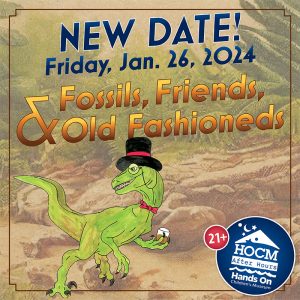
We’re back from extinction and we’ve changed our name!
Join us for a Dino-mite night at our Adults Only (21+) special event! Same great fun with an all-new-name HOCM After Hours. (Move over Adult Swim!) This is the perfect time for fossils, friends, and old fashioneds! Dig up your curiosity, dust off your khakis, and shake your bones to DJ Wes Jamieson. Unearth the secrets of paleontology with fossil experts from the Fossil Team PDX. Meet birds of prey with the Raptor Ambassadors and The Falconer. Try your hand at whiskey trivia, learn about distilling and craft your own infusion. Go back in time to the dawn of the dinosaurs and make a dino egg bath bomb and create a wax fossil cast.
Check out our website for more details and activities!
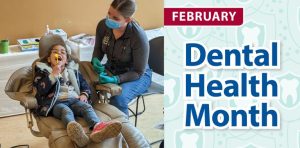
In February, we promote healthy smiles by joining with our dental community to offer free dental screenings right inside the Museum! Kids can pretend to be the dentist in our Puget Sound Dental Office exhibit and meet Amazon of Olympia as Wonder Woman and as Captain Carter (see below for dates and times). From sewing a toothy pillow to exploring super-sized animal teeth (fangs and sabers of giant cats), families can enjoy fun and engaging dental health activities all month long.
• Explore the Puget Sound Dental Office in the Emergency! Gallery, open every day
• Register for a free dental screening
• Build toothbrush bots
• See some of the biggest teeth (smilodon, big cats, wildcats)
• Sew a monster mouth or tooth fairy pillow
• Explore different animal and insect teeth (herbivore, omnivore, carnivore)
• Play with electric bytes (connect circuits to power dental objects)
• Meet and get your photo taken with Amazon of Olympia (as Wonder Woman) Feb. 2, 5–7 p.m. & Feb. 24, 2–4 p.m. Amazon of Olympia (as Captain Carter) will be here Feb. 17, 2–4 p.m.
• Free Dental Screenings for kids every Saturday in Feb. from 2–4 p.m. & First Friday Night Feb. 2 from 6–8 p.m. Museum admission is also free with your screening. Reservations required. Call (360) 956-0818 ext 0. Screening Sponsor, Small to Tall Pediatric Dentistry with support from SPSCC Dental Assisting Program.
Check out our Dental Health Month page for more information and a complete list of sponsors.

In February, we promote healthy smiles by joining with our dental community to offer free dental screenings right inside the Museum! Kids can pretend to be the dentist in our Puget Sound Dental Office exhibit and meet Amazon of Olympia as Wonder Woman and as Captain Carter (see below for dates and times). From sewing a toothy pillow to exploring super-sized animal teeth (fangs and sabers of giant cats), families can enjoy fun and engaging dental health activities all month long.
• Explore the Puget Sound Dental Office in the Emergency! Gallery, open every day
• Register for a free dental screening
• Build toothbrush bots
• See some of the biggest teeth (smilodon, big cats, wildcats)
• Sew a monster mouth or tooth fairy pillow
• Explore different animal and insect teeth (herbivore, omnivore, carnivore)
• Play with electric bytes (connect circuits to power dental objects)
• Meet and get your photo taken with Amazon of Olympia (as Wonder Woman) Feb. 2, 5–7 p.m. & Feb. 24, 2–4 p.m. Amazon of Olympia (as Captain Carter) will be here Feb. 17, 2–4 p.m.
• Free Dental Screenings for kids every Saturday in Feb. from 2–4 p.m. & First Friday Night Feb. 2 from 6–8 p.m. Museum admission is also free with your screening. Reservations required. Call (360) 956-0818 ext 0. Screening Sponsor, Small to Tall Pediatric Dentistry with support from SPSCC Dental Assisting Program.
Check out our Dental Health Month page for more information and a complete list of sponsors.

In February, we promote healthy smiles by joining with our dental community to offer free dental screenings right inside the Museum! Kids can pretend to be the dentist in our Puget Sound Dental Office exhibit and meet Amazon of Olympia as Wonder Woman and as Captain Carter (see below for dates and times). From sewing a toothy pillow to exploring super-sized animal teeth (fangs and sabers of giant cats), families can enjoy fun and engaging dental health activities all month long.
• Explore the Puget Sound Dental Office in the Emergency! Gallery, open every day
• Register for a free dental screening
• Build toothbrush bots
• See some of the biggest teeth (smilodon, big cats, wildcats)
• Sew a monster mouth or tooth fairy pillow
• Explore different animal and insect teeth (herbivore, omnivore, carnivore)
• Play with electric bytes (connect circuits to power dental objects)
• Meet and get your photo taken with Amazon of Olympia (as Wonder Woman) Feb. 2, 5–7 p.m. & Feb. 24, 2–4 p.m. Amazon of Olympia (as Captain Carter) will be here Feb. 17, 2–4 p.m.
• Free Dental Screenings for kids every Saturday in Feb. from 2–4 p.m. & First Friday Night Feb. 2 from 6–8 p.m. Museum admission is also free with your screening. Reservations required. Call (360) 956-0818 ext 0. Screening Sponsor, Small to Tall Pediatric Dentistry with support from SPSCC Dental Assisting Program.
Check out our Dental Health Month page for more information and a complete list of sponsors.

In February, we promote healthy smiles by joining with our dental community to offer free dental screenings right inside the Museum! Kids can pretend to be the dentist in our Puget Sound Dental Office exhibit and meet Amazon of Olympia as Wonder Woman and as Captain Carter (see below for dates and times). From sewing a toothy pillow to exploring super-sized animal teeth (fangs and sabers of giant cats), families can enjoy fun and engaging dental health activities all month long.
• Explore the Puget Sound Dental Office in the Emergency! Gallery, open every day
• Register for a free dental screening
• Build toothbrush bots
• See some of the biggest teeth (smilodon, big cats, wildcats)
• Sew a monster mouth or tooth fairy pillow
• Explore different animal and insect teeth (herbivore, omnivore, carnivore)
• Play with electric bytes (connect circuits to power dental objects)
• Meet and get your photo taken with Amazon of Olympia (as Wonder Woman) Feb. 2, 5–7 p.m. & Feb. 24, 2–4 p.m. Amazon of Olympia (as Captain Carter) will be here Feb. 17, 2–4 p.m.
• Free Dental Screenings for kids every Saturday in Feb. from 2–4 p.m. & First Friday Night Feb. 2 from 6–8 p.m. Museum admission is also free with your screening. Reservations required. Call (360) 956-0818 ext 0. Screening Sponsor, Small to Tall Pediatric Dentistry with support from SPSCC Dental Assisting Program.
Check out our Dental Health Month page for more information and a complete list of sponsors.














